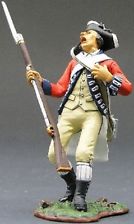“Cambridge April 21, 1775.
May it please your Excellency,
A number of Officers and Soldiers under your command were wounded on Wednesday last: they now lie in Cambridge and one or two adjacent Towns. They have had proper assistance from Surgeons, and are treated in every aspect with much humanity; but as they are desirous of seeing their own Surgeons, this is to acquaint you that any one Surgeon bringing a certificate from your Excellency, and by enquiring for Doctor Isaac Foster at Charlestown, shall be conducted in safety to the abovementioned Officers and soldiers and return unmolested to Boston.
I am with great respect,
Your Excellency’s most Obedient, humble servant
Joseph Warren
[To] His Excellency General Gage”
Source: Transcribed from Thomas Gage Papers, American Series, Vol. 127. Ann Arbor, MI: Clements Library, University of Michigan.
Commentary: Despite convulsive anti-British sentiment among Patriots triggered by the outbreak of hostilities two days prior on April 19, 1775; mutual accusations of atrocities committed by each side against the other; and mutual distrust; Joseph Warren was capable of reaching out across the developing siege lines to General Gage concerning humanitarian treatment of seriously wounded British officers. Through intermediaries, Thomas Gage took up this offer to get assistance to his wounded officers, if not common soldiers.
Warren’s tone is in marked contrast to his contemporaneous propagandistic and stirring public call to arms to Patriotic Americans. Despite specific authorization from London for Warren’s arrest as early as 1774, Thomas Gage never attempted to apprehend Joseph Warren. Even Gage’s mid-June 1775 proclamation specifying “condign punishment” for Samuel Adams and John Hancock did not condemn Joseph Warren in like manner. Perhaps this sort of interchange concerning the wounded softened Gage’s view of Warren. It might have provided an avenue of dialog and conciliation even after the convulsive bloodletting at Lexington and Concord. But such was not to be.
Even by courtly epistolary conventions of the time, Warren was definitely not General Thomas Gage’s “most Obedient, humble servant.”

 Follow
Follow